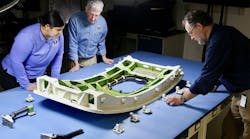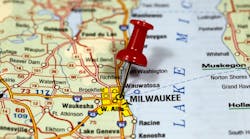By Woodruff Imberman, Ph.D.
The proposed law, called the "Employee Free Choice Act" by its supporters, would let unions organize a company's workforce in two different ways: Under the current National Labor Relations Board election rules, employers can insist on a strictly-supervised, secret-ballot election, the outcome of which is decided by a majority of the votes cast.
Under the proposed legislation, to win recognition rights at a company all a union would need to organize a company's workforce would be "authorization cards" from a majority of the workers there. This is known as the "card check" process. Foundries and their suppliers would have to honor the choice — which would be made by the union, not their own employees.
The proposed new law has 216 cosponsors in the House of Representatives, mainly Democrats. New House Speaker Rep. Nancy Pelosi (D-CA) stated in December the bill would probably come to a House vote in early spring. "We certainly will be passing the card check, the Employee Free Choice Act," she predicted, despite the strong opposition it is almost certain to face.
How the current law works
The new legislation upsets a lot of history. The 1935 National Labor Relations Act established a system of industrial democracy based on secret-ballot elections. Under the NRLA, elections allow employees to vote whether or not they wish to be represented by a union. The votes are supervised by the federal National Labor Relations Board.
Now, if more than 30% of the workers in a bargaining unit file signed "union authorization cards" with a local NLRB office, it will order an election. NLRB rules require the election to be held within 42 days of the filing of the original petition, unless there is a question of voter eligibility. Usually, such questions are answered quickly. For example, in fiscal year 2003 over 92% of all initial representation petitions went to election within 56 days petition filing.
Between the petition and election, both unions and employers are allowed to campaign, using their First Amendment rights to try to persuade employees to vote either for or against unionization. The NLRB has a long list of rules governing union and company conduct for this, to balance the competing interests of employees, unions, and employers. This is a daunting task for which it has frequently been criticized by both labor and management.
The Board conducts the secret-ballot election, in which workers cast secret ballots under close supervision of NLRB agents. No campaigning is allowed by either the union or management within sight of the voting area, nor can supervisors nor managers be nearby. The only people there are the NLRB field agent(s), several designated employee observers, and those who vote. The winner is the one for whom a majority of the votes have been cast. Either side can appeal an election to the NLRB, and then to the federal courts, a process that sometimes takes years due to the NLRB's sometimes dilatory practices.
What foundry execs want
Virtually all private employers wish to remain non-union. They point to the high costs of negotiating labor contracts; the highly restrictive union work-rules that result in wasteful work practices and feather-bedding, and the rigid contract provisions that prevent a company from reacting quickly to changing market conditions caused by non-union and foreign competitors. Companies dislike being forced into a "partnership" with antimanagement union leaders, who say they are happy to "help run the business." It's notable that many metalcasting companies are managed by entrepreneurs who founded them, or who oversee managers they hired to run the businesses.
What foundry execs believe
Virtually all private employers feel they treat their employees fairly, offer competitive wages and benefits — either for their area, or for the metalcasting industry — and deal with employee complaints openly, honestly, and quickly. I can cite dozens of examples of metalcasting industry executives who have been dumbfounded to receive a registered letter from the NLRB notifying them that their employees have signed cards authorizing a union to file an election petition. They cannot comprehend how a union organizer could contact their employees; how their employees could circulate authorization cards and organize a union drive under their noses; how "loyal" supervisors and managers did not catch wind of the effort — nor why their employees would ever want a union in the first place.
The widespread belief that union promises of higher employee wages and benefits cause employees to sign "union cards" is wrong. The real causes of union sympathies among foundry workers are perceptions of favoritism (often, based on ethnic differences), unfair treatment, and management indifference to the feelings and emotions of workers. Union leaders are quick to capitalize upon these feelings, and often seek out ethnic leaders to support their drives.
The first union to mix employee rights and civil rights was Local 1199 of the East Coast Hospital Workers' Union, now part of the Service Employees International Union. In 1969, Local 1199 hired civilrights leader Correta Scott King to help organize the service workers of Johns Hopkins Hospital in Baltimore. To emphasize their "Union Power, Soul Power" slogan, 1199 had the widow of Dr. Martin Luther King, Jr. climax their campaign with a speech declaring she considered herself "… a sister 1199er," and that "… my husband would have wanted you to vote for the union." Since then, black leaders have allied themselves with unions, mixing civil and employee rights into an anti-employer "witches' brew" virtually impossible to combat.
Hispanic leaders have followed this lead, seizing upon Latinos' real and perceived sentiments of mistreatment. These feelings were behind the highly successful wave of union organizing among Hispanic workers after the 1986 immigration-reform amnesties. Union organizers have co-opted today's Latino leaders, and are eagerly waiting for the chance to organize Hispanic workers today, some undocumented, and many of whom feel discriminated against by their employers. This is important to the foundry industry for which the nationwide average of Hispanic workers will reach nearly 20% in 2010, according to Census Bureau Estimates. (See "Managing The Hispanic Worker," FM&T, Feb. 2004, and, U.S. Census Bureau, Annual Demographic Supplement, March 2002, Current Population Survey)
The only way to deal with the realities of foundry employee discontents that cause workers to seek out a union is to identify those realities and remedy their discontents. This can be done best by an Employee Audit – not a simple paper-andpencil questionnaire, but by a skilled interviewer who understands what employees mean by what they say. Employees will speak more openly to an outside interviewer with no coercive power over them than to a representative of the management. Workers are afraid of retribution should they say anything to the management that's critical of supervisors or supervisory treatment, working conditions, alleged discriminatory treatment, inequitable pay differentials, incomprehensible benefits, or frustrations with the tools and equipment provided to them. For example, grinders are always a bone of contention among finishing-department workers. Any one, or combination of, these factors may irritate employees enough to seek union representation. (See "Improving Business Through an Employee Audit," Fabricator, Dec. 1998, and "What Your Employees Won't Tell You," Area Development, May 1998)
Debate over current rules
Private employers oppose the new legislation. They support the existing law requiring secret-ballot elections. Employers say workers are often pressured into signing such authorization cards by union representatives and prounion fellow employees. In addition, employers say quick card-check unionization prevents them from giving their side of the story – why unions are not in the employees' best interests. And, finally, they contend the new card-check process would deny workers the right to secret-ballot elections.
"It is very telling that first up on the Democrats' agenda after taking power is rolling back voting rights," said Rep. Charles Norwood (R-GA), former chairman of the House Subcommittee on Workforce Protections. "Democrats and their Big Labor bosses are seeking to steal workers' rights to cast ballots in a private voting booth."
Calling card checks unfair, Norwood said unions use physical force to make workers sign union-authorization cards. Card-check opponents also say cardsigning blitzes are conducted so quickly and surreptitiously by union organizers that employers have no chance to explain to their workers the disadvantages of joining a union.
On the other hand, labor leaders and their political supporters denigrate secret-ballot elections as a way to let employees decide if they want a union. They say employees' organizational rights have been badly compromised by aggressive anti-union campaigns mounted by companies against union organizing campaigns.
Unions are wildly opposed to the few, highly successful consultants many companies have used to defeat unions. The reason professional union organizers condemn a company for employing anti-union professionals to run their campaigns is simple – several have excellent track records, winning over 95% of their elections for management. (See "Hocus-Pocus of Union Avoidance," Journal of Labor Research, Vol. 1, no. 2, Fall 1980.)
Everybody agrees on one thing: the level of union membership among workers at private companies has declined sharply since its peak of nearly 36% in 1953. (see Table 3.) Today, the unionization rate for private employers is about 7.8%, concentrated in heavy industries that were originally organized in the 1930s – steel, old-line gray iron and steel foundries, automaking, shipbuilding, aerospace, and construction.
According to a 2005 Bureau of Labor Statistics study, "Union Members Summary," unionization is higher for men than women. It is highest among blacks, then whites, then Asians, and finally Hispanics. Unionization is also highest among workers aged 45 to 64, and lowest among those aged 16 to 24. (see Tables 1 and 2.) These statistics reflect today's reality — efforts by unions to organize minorities; and yesterday's reality — most of today's unionized workers were organized long ago, before modern anti-discrimination laws were passed and other workplace regulations were promulgated by state and federal agencies.
Pro-union supporters say President Reagan's 1980 firing of striking air traffic controllers was a milestone in changing American attitudes toward unions, giving an endorsement to anti-union action. Supporters claim with Reagan's encouragement employers began "vicious" anti-union campaigns, often resulting in the termination of pro-union employees. Pro-union supporters overlook that the flight controllers were federal employees and thus were (and still are) forbidden by law to strike. They also ignore the fact that when the Professional Air Traffic Controllers Organization's own employees tried to unionize, the NLRB ruled that PATCO itself committed "serious, pervasive, egregious, and substantial" unfair labor practices in its efforts to defeat the unionization attempt of its own staffers. (5-CA – 12341, 12506, 261 NLRB No. 132)
Pro-company supporters say union efforts to get employees to sign unionauthorization cards often cause peergroup strong-arm tactics in local taverns, "card-signing" parties where pro-union employees forge the names of others, and wide-spread lies that union victory will lead immediately to higher wages and benefits. Pro-company supporters also say a campaign is needed to give employees the full picture — the widespread corruption among union officials, union rules calling for exorbitant "initiation fees," dues, and other payments, and the fact that domestic unions make it harder for American companies to compete globally.
Legal precedents
The outcome of a union election has an enormous impact on the future of a company and its employees. Both employers and unions try hard to win, but they try hard to win within the complex and ever-changing NLRB election rules that balance the interests of all parties. Should one party feel the other overstepped the bounds, it files objections to the election, which the NLRB quickly investigates.
Despite occasional election misconduct, the Supreme Court, Appellate Courts, and the National Labor Relations Board in an almost endless string of precedents all affirm that secret-ballot elections are "… the most satisfactory – indeed the preferred – method of ascertaining whether a union has majority support."1
The U.S. has come a long way since the Great Depression, when unemployment was high, when management practices were punitive, when there was little foreign competition from foundries overseas, and when unions were necessary and helpful to preserving democracy against the totalitarianism expanding in the industrialized world. Today, America is still a "shining city upon a hill," affirming men's and women's rights of free choice, democracy, and self-determinism. Hopefully, the solons of Capital Hill will remember this heritage when they debate the Employee Free Choice Act.1. Legal precedents affirming secretballot elections as the best way to determin true employee sentiments include:
NLRB v. Gissel Packing Co. (395 U.S. 575), 1969; NLRB v. Flomatic Corp. (347 F.2d 74, 78 (2d. Cir. ), 1965; NLRB v. S.S. Logan Packing Co. 386 F.2d, 565 (4th Cir.) 1967; J.P. Stevens & Co. v. NLRB, 441 F.2d 514, 522 (5th Cir.) 1971; United Services for the Handicapped v. NLRB, 678 F2d 661,664 (6th Cir.), 1982, NLRB v. Village IX, Inc., 723 F.2d 1360,1371 (7th Cir.) 1983, Avecor, Inc. v. NLRB 931 F2d 924, 934 (C.C. Cir. 1991).
Woodruff Imberman, Ph.D., is president of Imberman and DeForest Inc., Evanston, IL. For additional information or copies of the articles referenced here, contact Dr. Imberman at [email protected], or by phone at 847-733-0071.









